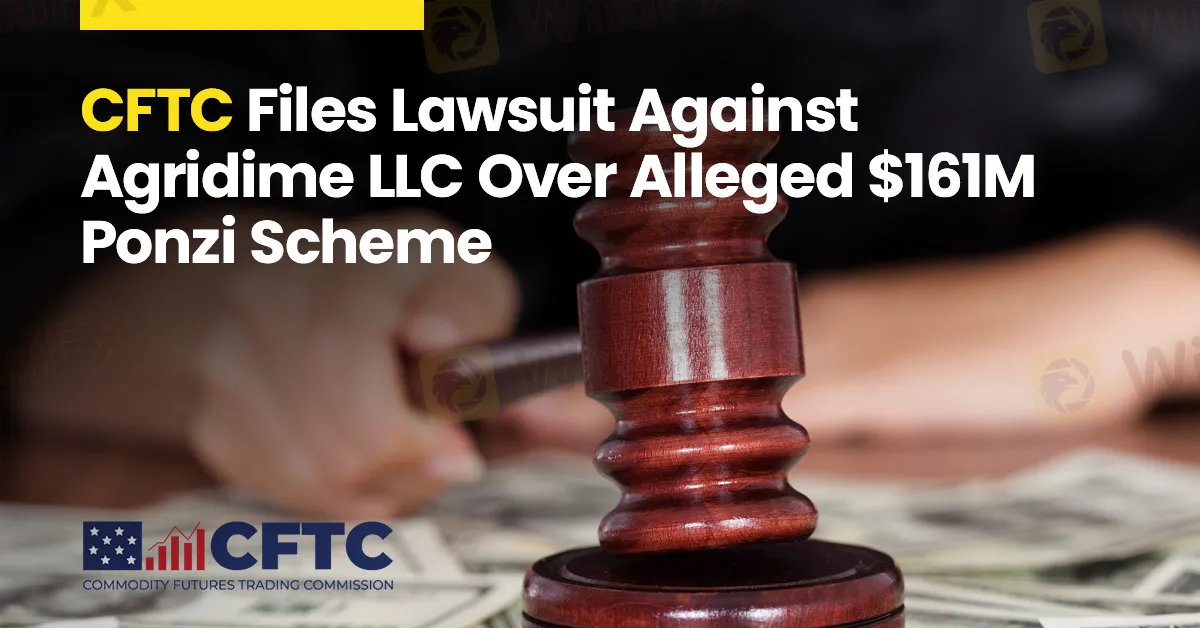简体中文
繁體中文
English
Pусский
日本語
ภาษาไทย
Tiếng Việt
Bahasa Indonesia
Español
हिन्दी
Filippiiniläinen
Français
Deutsch
Português
Türkçe
한국어
العربية
CFTC Files Lawsuit Against Agridime LLC Over Alleged $161M Ponzi Scheme
Abstract:The Commodity Futures Trading Commission (CFTC) has taken legal action against Agridime LLC for allegedly orchestrating a Ponzi scheme.

The Commodity Futures Trading Commission (CFTC) has taken legal action against Agridime LLC for allegedly orchestrating a Ponzi scheme.
On May 10, 2024, the CFTC lodged a complaint in the Texas Northern District Court against Agridime and its co-founders, Joshua Link and Jed Wood.
The complaint alleges that from 2021 to around December 11, 2023, Agridime and its co-founders perpetrated a scheme to deceive thousands of customers across at least fourteen states in the United States. The scheme involved soliciting and accepting customer funds under false pretenses, using them to pay other customers in a manner characteristic of a Ponzi scheme. These funds were purportedly meant for purchasing cattle but were not used for their intended purpose.
Throughout the period in question, the defendants reportedly received over $161 million from more than two thousand victims for the ostensible purpose of cattle procurement.
Agridime operated an online platform during this time, offering customers the opportunity to engage in cattle trading with promised annual returns of 15% to 20%. The company assured customers that they could profit from cattle raising without the associated day-to-day responsibilities.
Under Agridime's cattle program, customers were led to believe that their investment would be used for purchasing and caring for the cattle until they were ready for processing and sale. However, it is alleged that Agridime failed to fulfill its obligations under the cattle purchase agreements, necessitating the use of new customers' funds to pay returns to earlier investors.
Additionally, it is claimed that approximately $11 million in undisclosed commissions, including payments to Agridime personnel, were extracted from customers' funds.
The CFTC accuses the defendants of violating anti-fraud provisions of the Commodity Exchange Act and CFTC Regulations. Specifically, they are charged with breaching Section 6(c)(1) of the CEA and Regulation 180.1(a)(1)-(3).
The CFTC aims to halt the defendants' unlawful activities, ensure compliance with regulatory standards, and prevent them from engaging in any commodity-related activities. Furthermore, the CFTC seeks civil monetary penalties for each violation, as well as remedial measures such as trading and registration bans, restitution, disgorgement, rescission, and pre-and post-judgment interest.

Disclaimer:
The views in this article only represent the author's personal views, and do not constitute investment advice on this platform. This platform does not guarantee the accuracy, completeness and timeliness of the information in the article, and will not be liable for any loss caused by the use of or reliance on the information in the article.
Read more

5 Risks associated with Grand Capital
You can avoid fraud, crypto scams, and similar traps simply by staying informed. If you regularly follow forex news, there’s a lower chance that you’ll fall victim to such scams. Being aware is the only way to stay safe. That’s why you also need to know about the Grand Capital broker and why it should avoided.

Exposed: Ibell Markets - A Scam Broker That Does Not Allow Withdrawals
Ibell Markets adds to the infamous list of scam brokers who think about acquiring customers and their investments. But what about the withdrawal? Do they allow? Read this to find out.

Avoid Trendify: 5 Red Flags Revealed
Trendify is nothing more than a scam broker. It is one of those forex brokers that acts genuine but is actually full of red flags. Before you invest and fall victim to its investment scam, its better to check out the risks involved with Trendify.

Forex Interbank Rate & How It Influences Your Trading
A forex interbank rate is nothing but the wholesale currency exchange rate that banks and other major financial institutions use to trade currencies among themselves. Read more about it.
WikiFX Broker
Latest News
FCA clarifies expectations on bullying, harassment and violence to deepen trust in financial service
Asia-Pacific markets mixed after Trump shifts goalposts on tariffs again
XS.com Expands Global Reach with Landmark Kuwait Launch
European markets set to open mixed amid fresh U.S. tariff threats
Top Wall Street analysts are pounding the table on these 3 stocks
Stock futures fall after Trump team says tariffs will go into effect on Aug. 1: Live updates
10 Unlicensed Brokers Exposed – Check Now to Stay Safe!
S&P 500 futures fall slightly as Trump threatens new tariffs, Tesla shares drop: Live updates
Stocks are lower despite Bessent saying several trade announcements are ahead: Live updates
Exposed: Ibell Markets - A Scam Broker That Does Not Allow Withdrawals
Currency Calculator


